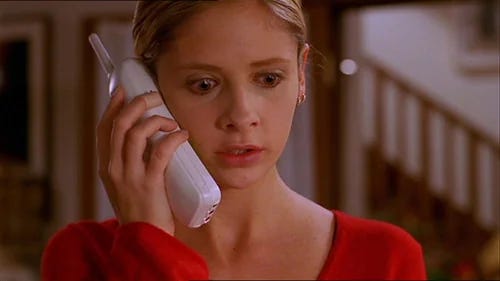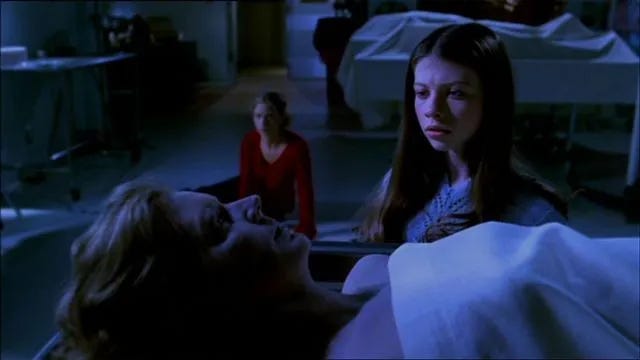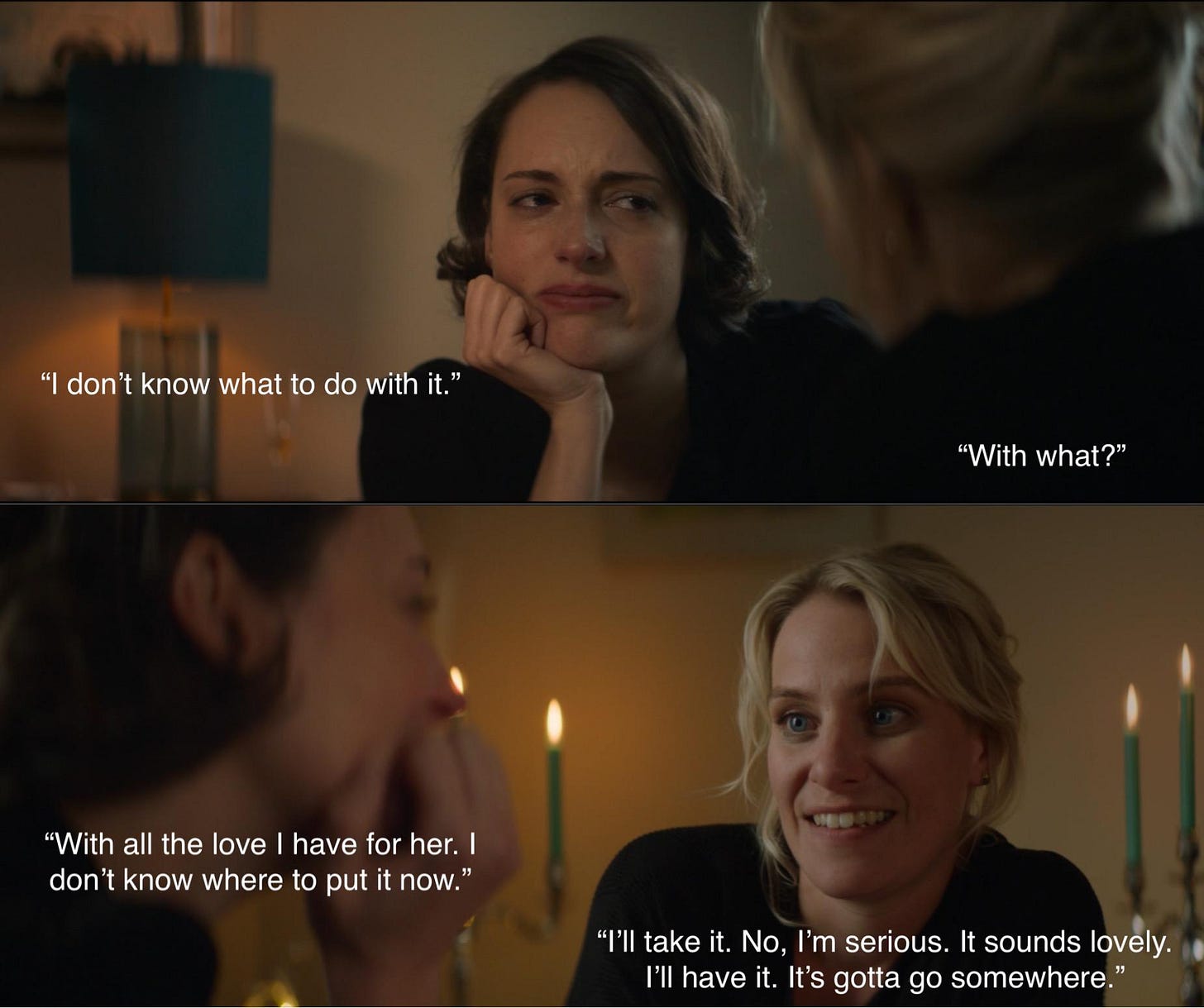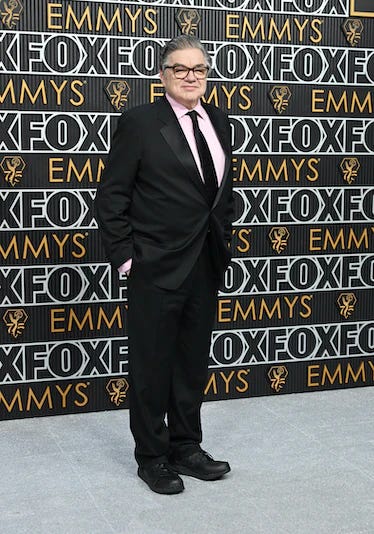Not An Emmys Recap But A Second More Mysterious Thing
Like many of the characters behind last night's Emmy wins, I am depressed and reflecting
You may have noticed a large YWSW-sized hole in your inbox this weekend (or many of you might not even know when we publish because we’re so deeply inconsistent…) That was my fault. I was planning to write a lighthearted essay about Jon Hamm’s cameo on Gilmore Girls. Every day I’d come back to a blank page, trying to start in on a joke, a metaphor, sprinkle in some pop culture references. But I was taking it all too seriously and so nothing sounded natural or funny. Mallika (who is currently shivering somewhere in the -30 degree Chicago windchill) graciously entertained my delays and excuses. I was always hopeful the next day would bring the lightness required to write a lighthearted essay. And then Sunday morning arrived and I resigned to the fact that my heart is not light, but very very heavy.
I promise one day soon I will write the Gilmore Girls essay but sometimes this is a fun television analysis newsletter and sometimes it is a diary and today, I’m so sorry to say, it will be a diary1.
Over the holidays, someone I loved a lot died unexpectedly. My life thus far has not been entirely untouched by death, but this is a grief that feels new and there’s a big part of me that feels new too. The all-knowing algorithm recently drudged up a 2021 essay about grief by JP Brammer in his “¡Hola Papi!” series for The Cut. In it he wrote, “loss isn’t merely subtraction. It doesn’t just take. Loss is also change.” There is some small solace I’ve found in that change, and I do think it pertains to this newsletter, so I’m going to tell you about it.
I’ve found, through all of this, what I think is a new understanding of narrative, as if my loss has opened the door to viewing some of the stories I love in a new way. It’s like listening to a song about heartbreak and longing to have experienced that heartbreak, so the song can strike the nerve it was intended for.
At the same time, art prepares us for the things we can’t yet understand. The reason we love sad songs or movies even when we are not sad is because we know one day we will be. Movies and TV in particular serve as a rehearsal for all of life’s big moments. We insert ourselves in characters as they fall in love, fight with their friends, go through breakups and lose people they love and we put faith in the writers and actors’ ability to depict this truthfully, so that when all of it happens in real life, we’re not taken by surprise. Of course, it’s difficult for television and film to make good on this promise. Narrative is not life itself but the result of what a person can perceive and then articulate about life. A lot gets filtered out in that process.
But still, as someone who has for all of her life held an almost religious devotion to narrative and its ability to both protect and unlock, it’s no wonder that television was at the forefront of my mind while big things were happening. Death felt like a test I was prepared for. In fact, I was shocked how much death felt like a movie, a tv show. The cynic in me must not have trusted these creators to get something so big so right. Afterall, when it comes to romance and even friendship, these shows have often led me astray. I must have subconsciously tossed my faith in their accuracy out the window when I realized that I would, in fact, not have two handsome suitors vying for my attention at any given moment.
But turns out, death is easier to write than love.
There are certainly shows that capture the experience better than others. Buffy the Vampire Slayer does it best with “The Body.” It’s an episode that often makes it to the top of lists like “Most Unwatchable Episodes” or “The Most Harrowing TV You Can’t Watch More Than Once,” which I’ve always thought was funny because I watch it all the time, perhaps just appreciating the art of its specificity. I knew the details that Joss Whedon weaved into that episode in which *big spoiler* Buffy finds her mother lying lifeless on the couch, dead from a brain aneurysm, had to come from somewhere that was deeply true.
There’s no score throughout the entire episode. We see things from Buffy’s perspective, the buttons on the phone she uses to call an ambulance appear larger than they actually are as life feels distorted and out of reach. She can’t look the paramedic in the eye and so neither can we — the top of his head is cut off from the screen. “The body,” which is no longer Buffy’s mother Joyce, is shown being tossed around a variety of settings. It’s on a stretcher, in a body bag. Buffy’s sister Dawn, who is shielded initially from seeing “the body” is desperate to catch a glimpse, otherwise she can’t conceptualize that her mother is actually gone. The final shot in the episode is Dawn reaching to touch the body that was once Joyce, lying on a metal bed in the hospital morgue. Buffy tells her “It’s not her.” Dawn asks, “Where’d she go?” The scene cuts out before Dawn can actually touch her. There’s no answer to her question.
I thought about this episode so much on the night of, I wondered whether it had accurately portrayed death or if I had watched it so many times I was modeling my own experience after it. Either way, I felt like I knew what to do, knew how to feel. Sounds like the faucet running in the downstairs bathroom of my parents house, where I peed one more time before we left for the hospital, were amplified by a deafening silence. I realized that in my life on a normal day, my brain crafted a score of sorts, songs that were stuck in my head, loud disjointed monologues planning ahead for the week, past conversations or imagined future conversations played on a loop. All of it was quiet, jolted to the present moment where I was trapped. But because of “The Body” this was familiar to me, expected. I realized I must have been drawn to the episode before because I really was trying to prepare myself, to study for what was to come. If there was a top-rated ‘Guide to Sudden Death for Dummies’, this was it. I had even read the transcript of the audio commentary Joss Whedon gave for the episode, which I kept coming back to as I was experiencing my own version of what he was describing.
This episode was one that I did because I wanted to show – not the meaning, or catharsis, or the beauty of life, or any of the things that are often associated with loss, or even the extreme grief, some of which we do get in the episode. But what I really wanted to capture was the extreme physicality, the extreme – the almost boredom of the very first few hours. I wanted to be very specific about what it felt like the moment you discover you've lost someone.
And so what appears to many people as a formal exercise – no music, scenes that take up almost the entire act if not the entire act without end – is all done for a very specific purpose. Which is to put you in the moment. That moment of dumbfounded shock. That airlessness of losing somebody.
Far be it from me to give Joss Whedon his flowers but, The airlessness of losing somebody is so spot-on. This should contrast with another element of death Whedon describes as an “almost obscene physicality,” but it doesn’t somehow. What I found about death is it expands the threshold of what our eyes and our minds can tolerate. Just like with the silence, there’s no running away from the present moment. So instead of physically removing oneself from the harsh reality, at least for me, the focus softens into a dream-like quality. Death is a TV show, I kept wanting to say out loud. Because to me, it was. And I couldn’t tell if it was because television is so accurate or because my brain was translating the experience into cinema as a natural defense.
A few weeks after my grandfather died, I had to make a presentation in my high school English class about the person I admired the most and I remember I spent hours making the sappiest scrapbook about my grandfather. Once I was done, I had a moment of clarity in realizing I would have to read this in front of an entire classroom of my peers, so I changed my mind and spent about 20 minutes making a PowerPoint about… wait for it… JK Rowling. Woof. Anyway, I fear this newsletter might be veering towards another scrapbook-situation. But my point is not really to discuss this loss in detail. I hope one day I can write about the person, about what they meant to me, how they’re the reason I love stories so much to begin with. But it’s not the time for that yet. But moments like these do make me realize how deep my connection to television runs.
As a kid, I’d use television, actually not even television itself but the THOUGHT of television, to both comfort me and frighten me. When I would become anxious about the idea of loneliness, I’d think to myself, If someone dropped me on a desert island by myself, but they gave me access to all the TV I wanted, I think I’d be OK. The characters that had endeared themselves to me felt close enough, my relationship to them intimate enough, that I imagined they could fill any void.
Conversely, sometimes I’d think, just to give myself a little jolt of fear, I’m not living in a TV show. All of this is really happening. And for whatever reason, it would send a shiver down my spine, like when you close your eyes and realize you can make the little black particles on the back of your eyelids either look as if they are very far away or extremely close. Without TV, which had provided a comforting rubric for how to live my life, my foundation felt shaky. TV was and is a comfort blanket I’ve never really learned to live without.
But I’m at this strange crossroads where I don’t know if television has actually been a teacher all along, preparing me for difficult moments. Or if I am just pasting it like a bandaid on top of a situation that is devoid of catharsis, of meaning.
Faced with this question, the first element I’d need to examine is the difference between experiencing death and experiencing grief. My one dispute with Joss Whedon’s commentary on “The Body” is that he calls it an episode about grief. It’s an episode about experiencing death, and all its “dull eccentricities” but I think grief comes later in the series. You feel it the most in season six, when it becomes clear that the lightness to the show that departed with Joyce wasn’t ever returning. For me, those are much harder episodes to watch than “The Body.” Death is short, which means it’s easier to get right in terms of depicting it on screen. Grief is harder to define and I fear it goes on longer than any series run (except maybe Grey’s Anatomy).
And yet, television’s depiction of grief is vast, varied, and often toxic. For the longest time, because of my TV addiction, I viewed grief abstractly as a plot device. Knowing someone who’d died made you more interesting. It made you sad, and therefore it gave you a connection to other people who were also sad and that was a beautiful thing. Especially if that other person was hot and slightly troubled and only had eyes for you because you “understand each other,” like Stefan Salvatore latching onto Elena Gilbert in the wake of her parents’ death in The Vampire Diaries. Death was an opportunity for the people who really love you to be there for you. It was an excuse to be a sad, fragile little bird who could be swept up by the nearest kind soul. I.e, to be Grey’s Anatomy’s Izzie Stephens, sobbing in a ball gown, carried by her soon-to-be-new-lover Alex Karev into an elevator away from her-current-dead-lover Denny. I was someone who balked at showing vulnerability, who was never, at least through my own perception, viewed as delicate. So sometimes I had a grand time imagining myself as the mascara stained mess of a girl who caught everyone’s attention and sympathy with her grief.
I’ve known for a while now that grief or trauma guarantees you none of this. In many ways, it’s isolating. But I think in the same way that television put these false notions into my head, it also helped me unlearn them. Shows like Buffy, Six Feet Under or more recently The Bear, Fleabag, Shrinking, even Succession have begun to replace more romanticized depictions of loss and grief with realistic ones. Fleabag’s breakdown at her mother’s funeral in particular has always echoed in the back of my mind, especially now. She said she didn’t know what to do with all the love she had for her, and her best friend Boo replied “I’ll take it.” With this scene and all the mess that comes after it, the show both defined grief as the weight of the love you have for someone who has passed and examined how complicated but necessary it is to distribute that love elsewhere.
Yet I still find myself wanting to lean on the romanticizing of loss, as if the texture it adds to my personality is the only silver lining. I think about how grief is so seamlessly baked into television characters, there must have always been some dormant part of me that longed for it, felt incomplete without it. Characters like Fleabag, Sookie and Jason on True Blood, Veronica Mars, the kids in Full House, even Michael and George Michael on Arrested Development, or freaking Jack Reacher on Reacher, every other show you can think of has a central character that is colored by grief. Even Luke from Gilmore Girls wouldn’t be a grumpy diner owner if his father hadn’t died and left him his hardware store.
I wonder if just as we use television in anticipation of loss, it also anticipates us. Why would every TV show center loss so heavily if it was not expecting its viewers to relate, to see themselves in the pain?
Some shows like The Bear throw you into the anxious drumbeat of grief, the chaos it unravels. I relate to that, the disjointed canals in my mind might be evident in this essay itself. But I also appreciate the way television weaves grief into everyday life, making it set dressing for jokes and joy and plots that are completely and gloriously unrelated to death. My current comfort show The Durrells of Corfu is premised on a family still coping with the death of their father several years after he’s passed. The show is a delightful and frequently hilarious circus of adventure, with a literal zoo of animals and characters who are funny and endearing and experience love and heartbreak and everything in between. But grief is always a low hum in the background.
Now I feel like it’s humming for me.
B Plot
Question: What’s your favorite comfort show?
Mallika: The unspoken rule of new year’s resolutions is that you don’t actually have to make any progress on them in January because January is hard as it is. So despite saying last week that I was going to try to watch more upbeat shows, I am sticking to my guns and saying Law and Order: SVU. Why? Well, I’m so glad you asked. Please refer to my entire essay on why the Detective Olivia Benson-led series is the ultimate comfort show. But also, I did recently start Modern Family and that could creep up my comfort show list… time will tell.
Rachel: I mentioned The Durrells of Corfu which you should all check out on Amazon Prime if you haven’t already (Warning: It will make you actually like a white British family). But other than that I’ve been struggling to settle on a comfort show. It was always Gilmore Girls, but I retired it on my 100th rewatch a few years ago, finally starting to hear the gratingness of the dialogue. It was Buffy last year but then I made it to season six, which as I said above is the opposite of comfort. I always want to watch something like New Girl or It’s Always Sunny but I can never decide what season to start in on. I guess my answer is I’m lost and need guidance. What SHOULD my comfort show be?
C Plot (Emmys Edition)
If you thought we are too disorganized to write an entire issue about the Emmys in a newsletter focused solely on TV… you are right. But here are a few thoughts.
Other than solidifying her spot as (hopefully) one of the most sought-after actresses of the moment with her win for best supporting actress in a comedy series for The Bear, Ayo Edebiri once again proved she is all of us (must be said in the voice of Ariana DeBose saying “Jamie Lee, you are all of us”). She’s still renting… she dreamed of dental insurance… she pretends to be from Ireland for no reason…she’s the people’s princess for real (but so is Oliver Platt and don’t you forget it).
There will always be a best actor win we vehemently celebrate for a show we don’t care about at all and this year, that was Niecy Nash for Dahmer – Monster: The Jeffrey Dahmer Story (yes they insist you spell it out completely like that every single time). This show was controversial and frankly too gross to get through (that’s a lot coming from us) but we will always cheer for Niecy. For us, she won this for her very important role of Devi’s therapist in Never Have I Ever. Also news just broke that Javier Bardem and Chloe Sevigny are set to star in Netflix’s next season of Monster (which apparently is an anthology series now… and tell us what the difference is between this and all of Ryan Murphy’s American Crime Stories??) as the real people Jose and Kitty Menendez, who were murdered by their sons Lyle and Erik. We are unfortunately going to have to put our judgement of Hollywood’s obsession with real people’s tragedies aside in support of OUR parents.
Ali Wong and Bill Hader were the power couple of the night whom no one is paying enough attention to. Wong’s Netflix miniseries Beef swept which, for reasons you can read about here, Rachel is very happy about. But Barry was shut out and disrespected AGAIN which Rachel is not happy about. There should be a case study on why, in this particular moment in television, Barry and Better Call Saul have not been awards darlings and perhaps Rachel will write that. But for now, we want to hone in on the way Hader has entirely assumed the role of Wong’s Ken. The way he got up in that crumpled ass valet suit to hold her hand up the stairs to the podium just to AGAIN be snubbed in that acceptance speech while Wong gushed about another man in her life (in the Golden Globes, it was her ex, this time it was her late father). Wong said I said what I said and we respect that.
The Emmys obviously took one look at Jo Koy’s Golden Globes catastrophe and said… we need Ellen Pompeo and Katherine Heigel on stage together STAT. The awards show very smartly used most of its downtime reuniting beloved casts from the past, most notably the original cast of Greys Anatomy, which also included Justin Chambers, James Pickens Jr. and Chandra Wilson. Not Sandra Oh or TR Knight though which is interesting because Oh is obviously in town. She appeared a few days earlier at the Critics Choice Awards. Miss girl has still not forgiven Izzie for cutting that LVAT wire…
Speaking of folks who didn’t show, Jeremy Strong didn’t make it to the biggest television awards show of the year because he was filming a movie, according to the rest of the cast and crew… likely story. Only one Jeremy was going to win that night and he knew it wouldn’t be him. If we knew a Culkin, who had already pantsed me in the press, was going to win over us, we too would stay home. But we missed that brown suit.
I wrote this paragraph before I actually finished the essay, which ended up being much more analytical than personal, which I think is emblematic of why I am simply not someone who can keep a diary.









This is lovely, Rachel! I found myself drawn to specific and often surprising TV and pop culture when I was grieving my dad. (For instance, I was really into, of all things, Handmaid's Tale. But also The OC.)